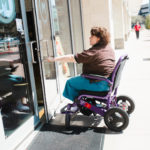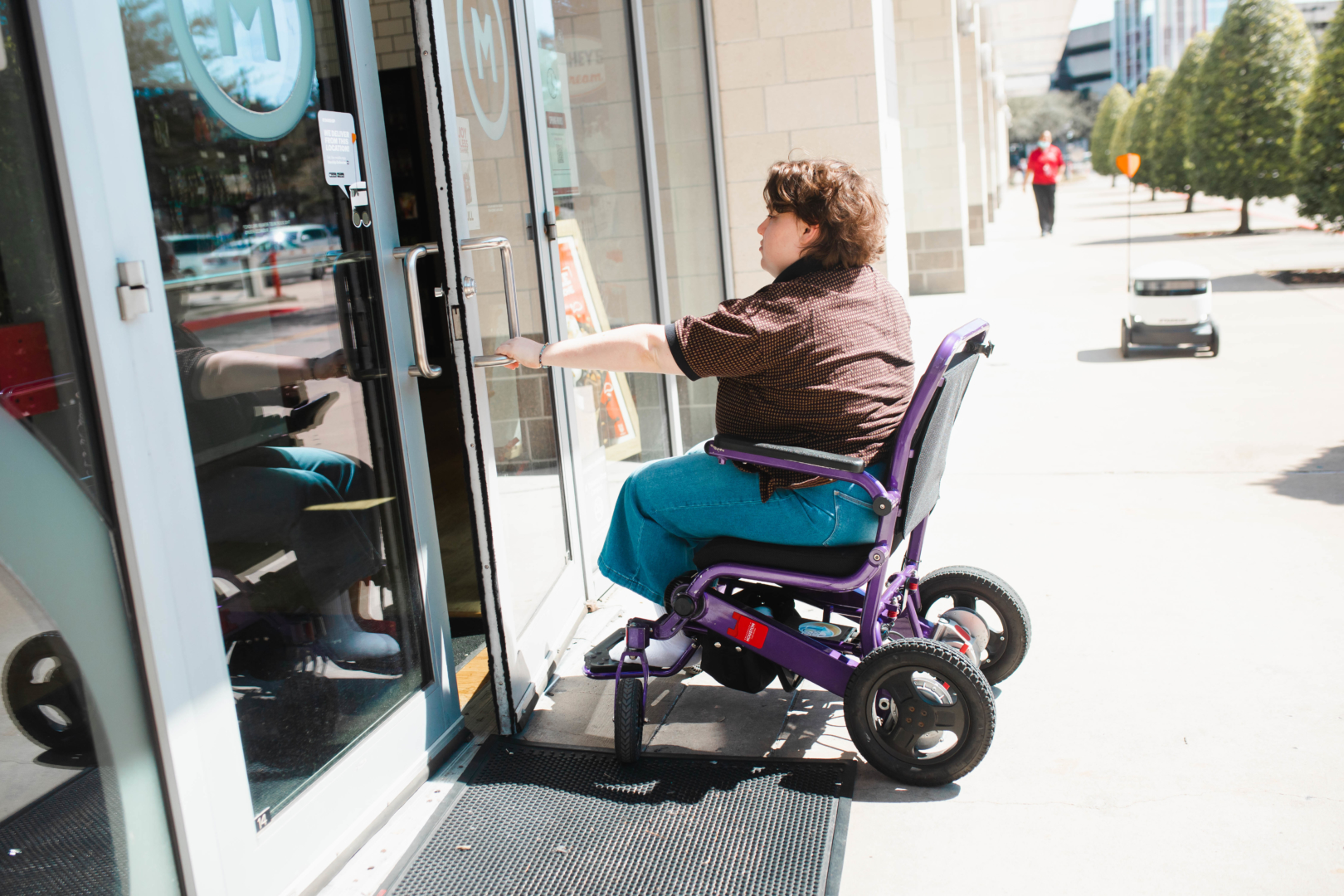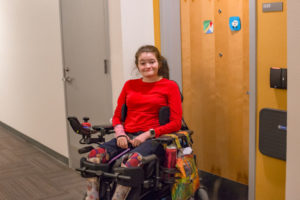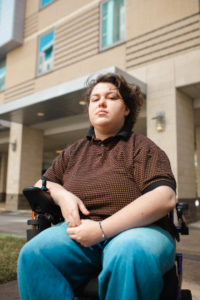

For students like Geneva Hitzel, getting through manual doors is a challenge, especially with a wheelchair. | James Schillinger/The Cougar
In 2019, theatre senior Allison Funk broke her wrist attempting to leave her suite room. In 2021, marketing senior Geneva Hitzel sustained multiple injuries after being struck by a car when crossing the street. Both students use wheelchairs.
But according to the director of the Dart Accessibility Center Kyle Mutz, the University is “pretty accessible.”
Injuries

Allie Funk broke her wrist while trying to leave her residence hall. | Trevor Nolley/The Cougar
When Funk moved into Cougar Place, her first residence hall at UH, only one of the four wheelchair bound students in the building had a door that accommodated their needs. It wasn’t until she broke her wrist that the school decided to install accessible doors in the building. But Funk and other students with disabilities still find it difficult to get around campus.
“It’s (getting around campus that’s) definitely been frustrating, not just with my dorm situation, but just with the campus in general,” Funk said. “A lot of the door buttons don’t work, or the doors just don’t have buttons. I’m not sure if it’s funding, or if it’s just the attitude towards a lot of accommodations.”
Funk has a rare neuromuscular disease called congenital hypomyelinating neuropathy, which affects the strength of her muscles, and has to use a mechanical wheelchair known as a power chair.
“When I tell my muscles to do something, the nerves don’t actually tell them to do it,” Funk said. “That’s led me to use a power chair basically since I was in preschool, and so getting around in public with a wheelchair isn’t new for me.”
Funk complained about the lack of an accessible door in her residence hall for months by writing emails to Student Housing and Residential Life and President Renu Khator.
“According to housing, the room I’m in is wheelchair accessible,” Funk wrote in her email to Khator. “However, I cannot get in and out of my room on my own. The door to my room is extremely heavy, and the keypad buttons are too stiff for me to press. Getting out of my room is a huge struggle, and I’ve hurt my shoulder and my ankle trying to get out of my room just to go to class.”
Despite the daily struggles she expressed to University faculty, it wasn’t until she broke her wrist trying to get out of her manual suite door that UH decided to take action.
Within weeks, the University made all the doors within Cougar Place and University Lofts automatic in rooms where students with wheelchairs resided.
Funk isn’t the only student who has suffered injury because of lack of accessibility at the University.
Geneva Hitzel, a marketing senior, who is also wheelchair bound currently lives at University Lofts.
In Dec. 2021, Hitzel was crossing the crosswalk between her apartment and the Nook Cafe, when she was struck by a motorist making a turn through the intersection. She had a few injuries, but the University never contacted her to check on her condition.
“I tried to call my Center for Student Disabilities adviser but they never got back to me after that, but you know, at a certain point you just lose hope,” Hitzel said.
Accessing UH daily
Since moving to UH, Funk has found it difficult to do everyday tasks that the average able-bodied person wouldn’t think about. As a part of the University’s theatre program, Funk brings up requests to her professors, like doors that don’t work, or areas that aren’t wide enough for her wheelchair, but she’s continuously dismissed.
“Instead of people in that department, and in the University in general, being like, ‘Oh, our building has all these problems, we need to fix these things,’ it turns into ‘Allie complains about everything.’”
Hitzel feels similarly. She attends classes at Melcher Hall sometimes, and has noticed a pattern with smaller classrooms that makes it difficult for her to focus on classwork.
“The auditoriums have specific, open seats for people with wheelchairs,” Hitzel said. “But for these smaller classrooms, my teacher has to pull the desk out for me. I went to (my class) for the first time, and I was like, there’s no place for me to sit,” Hitzel said. “So I just parked myself in front of the stairs, next to the rows of seats, with my notebook in my lap – which is already hard to write notes, especially if you don’t have a desk in front of you.”
Entering buildings is difficult for Hitzel too. If she has a class on one side of a building, sometimes, the entrance will be on the opposite side, making her late to class.
“It causes you to be late to class and whatever, or you have to leave earlier than everyone else because they don’t have ramps on all of the four entrances of the building, you know?” Hitzel said.
Making changes
The Dart Accessibility Center tries to help with accessibility needs like testing accommodations, captioning services and connecting students with on and off campus health care.

The Justin Dart, Jr. Student Accessibility Center provides accommodations for students with disabilities on campus. | James Schillinger/The Cougar
Nationwide, a little under 20 percent of undergraduate students identify with having a disability, according to the National Center for Education Statistics. At the University, there were 2610 students registered with a disability at the Dart Center, by the end of the 2021 fiscal year.
As of Oct. 2021, Kyle Mutz was appointed as the center’s new director, and considers the school rather accessible.
“In my perspective, it’s pretty accessible, I know, there are things that we need to improve, like, there’s some sidewalk access, building access, and just in general, I haven’t had a chance to look at every part, but we’re definitely looking to improve physical access.”
Students though are still looking for actual change to take place, and Mutz is trying his best to reflect that in the department’s work under his leadership, including hiring some new permanent staff.
“We’ve hired some access coordinators that work with students regarding their accommodations,” Mutz said. “We’ve hired a new testing coordinator to work with the entire campus and we invested in hiring an assistive technology specialist that will help educate in rollout assistive technology across the University.”

Hitzel wants to see change, not just at UH but in society as a whole. | James Schillinger/The Cougar
But they’re not just looking for change at the university level, but in society as a whole.
“I’m not saying any of this in like, ‘Oh, I hate this school or whatever, blah, blah, blah,’” Hitzel said. “It’s not even just the University of Houston, it’s society at large. A lot of times, disabled people are put on the backburner, and we’re just not thought of in any kind of process.”
Hitzel says until those changes are made, the University’s claims about UH being diverse are meaningless.
“If Renu Khator is going to preach about diversity, you better back it up by actually being accepting and accessible to your disabled students,” Hitzel said. “If you’re not then you know, a lot of your words are empty.”
news@thedailycougar.com
—
“‘At a certain point you just lose hope’: Students share their struggles with UH’s accessibility” was originally posted on The Cougar
